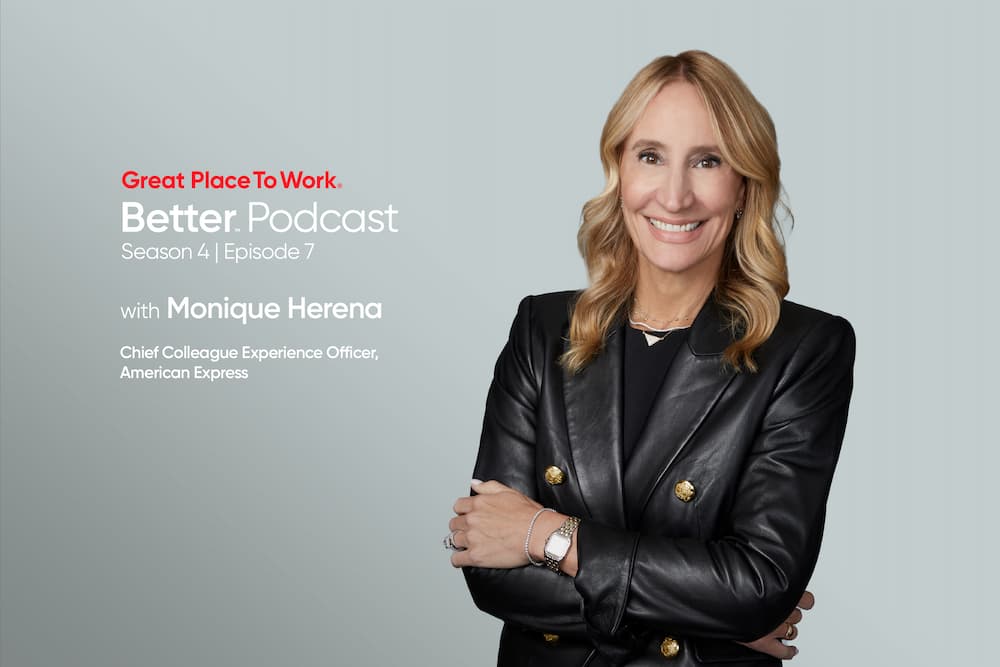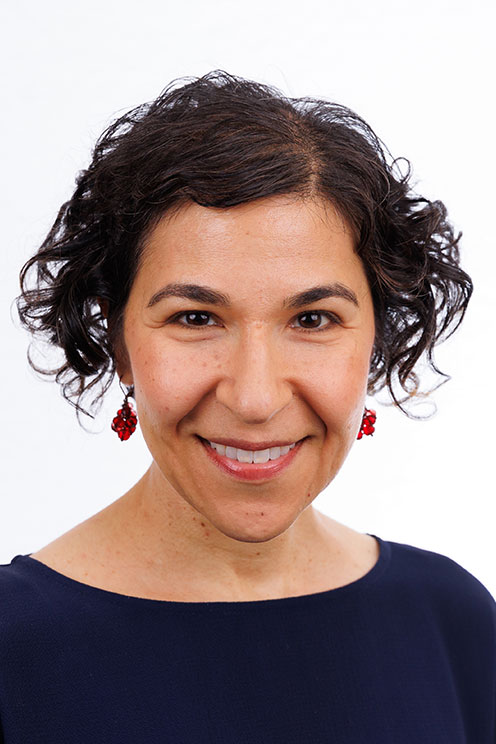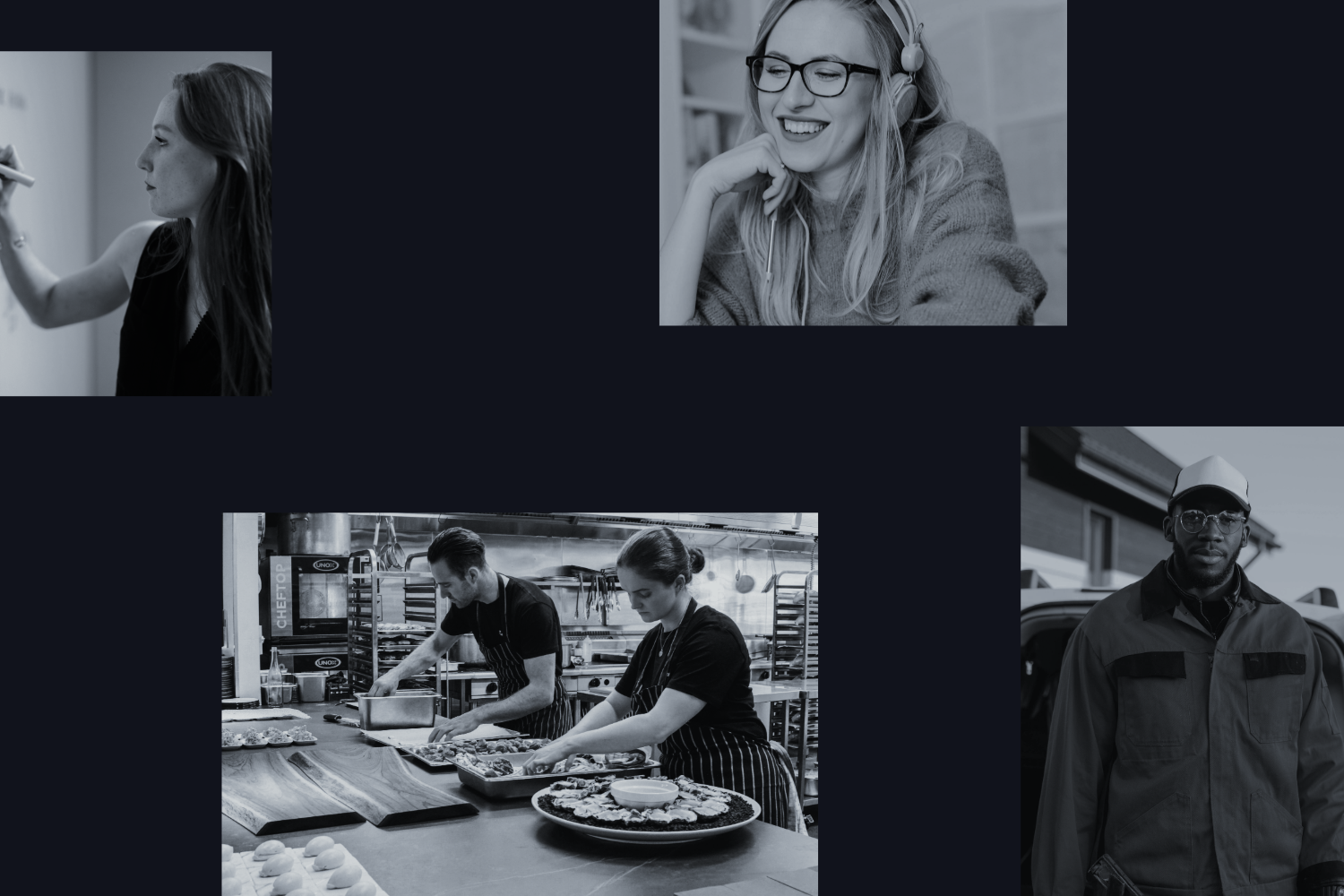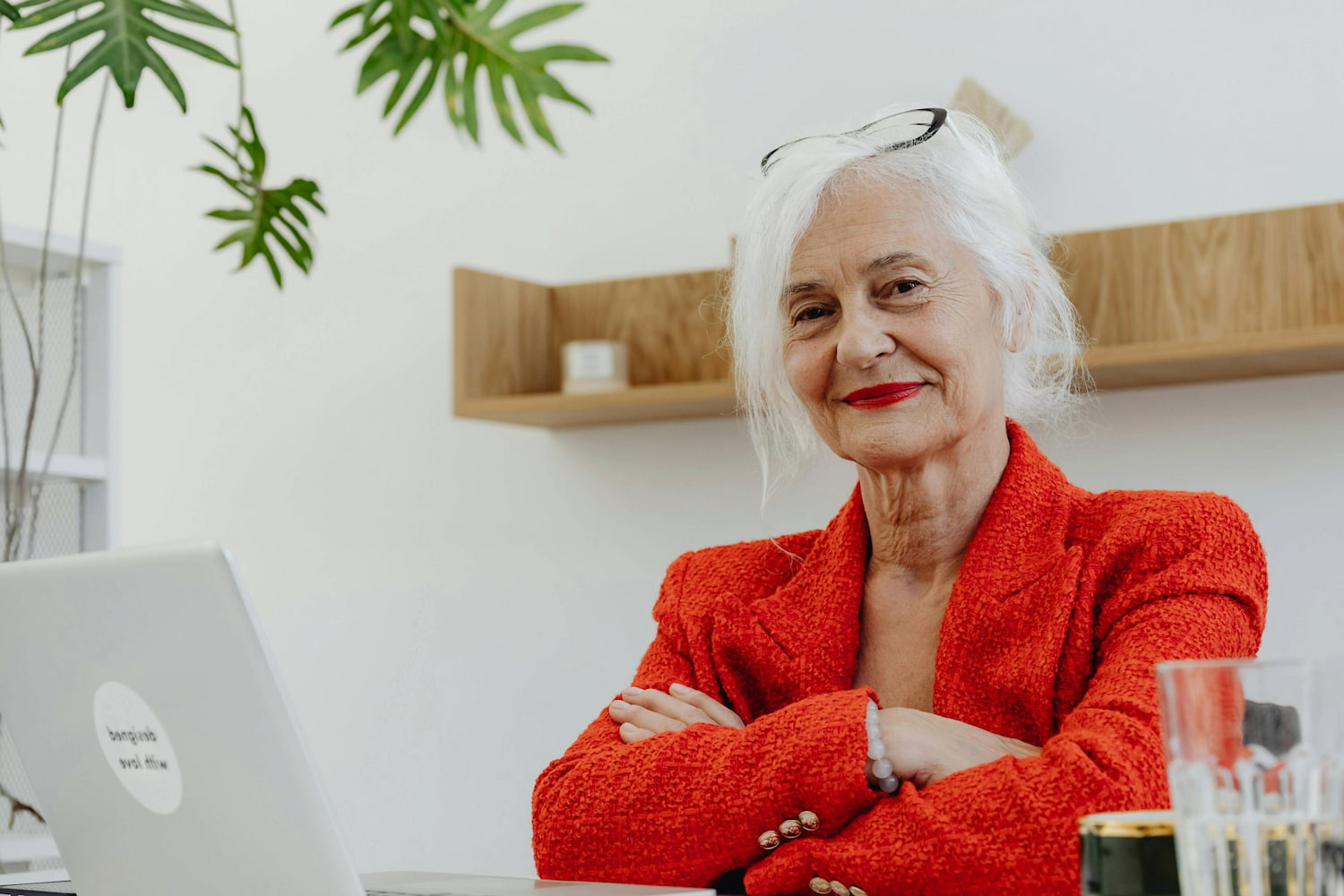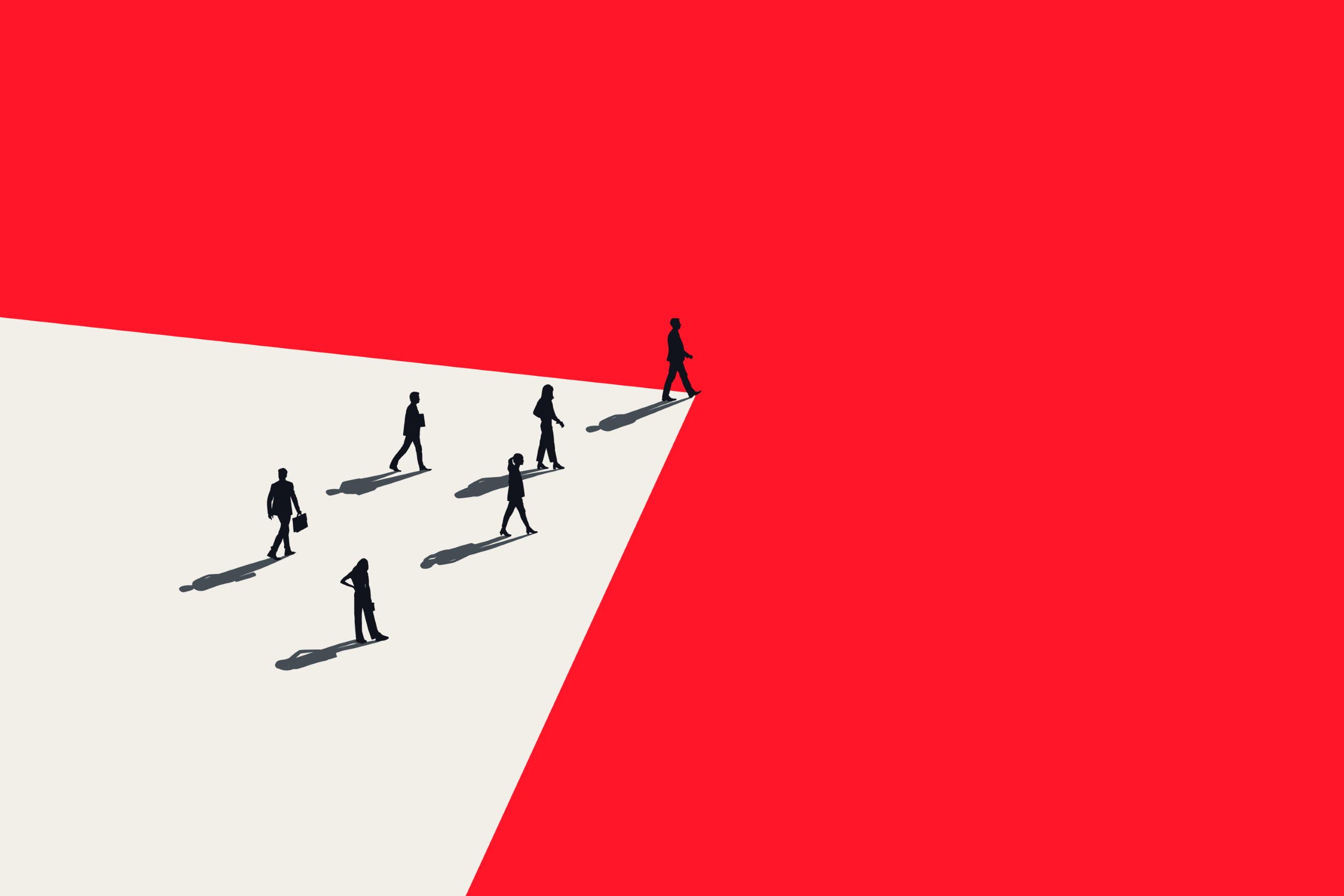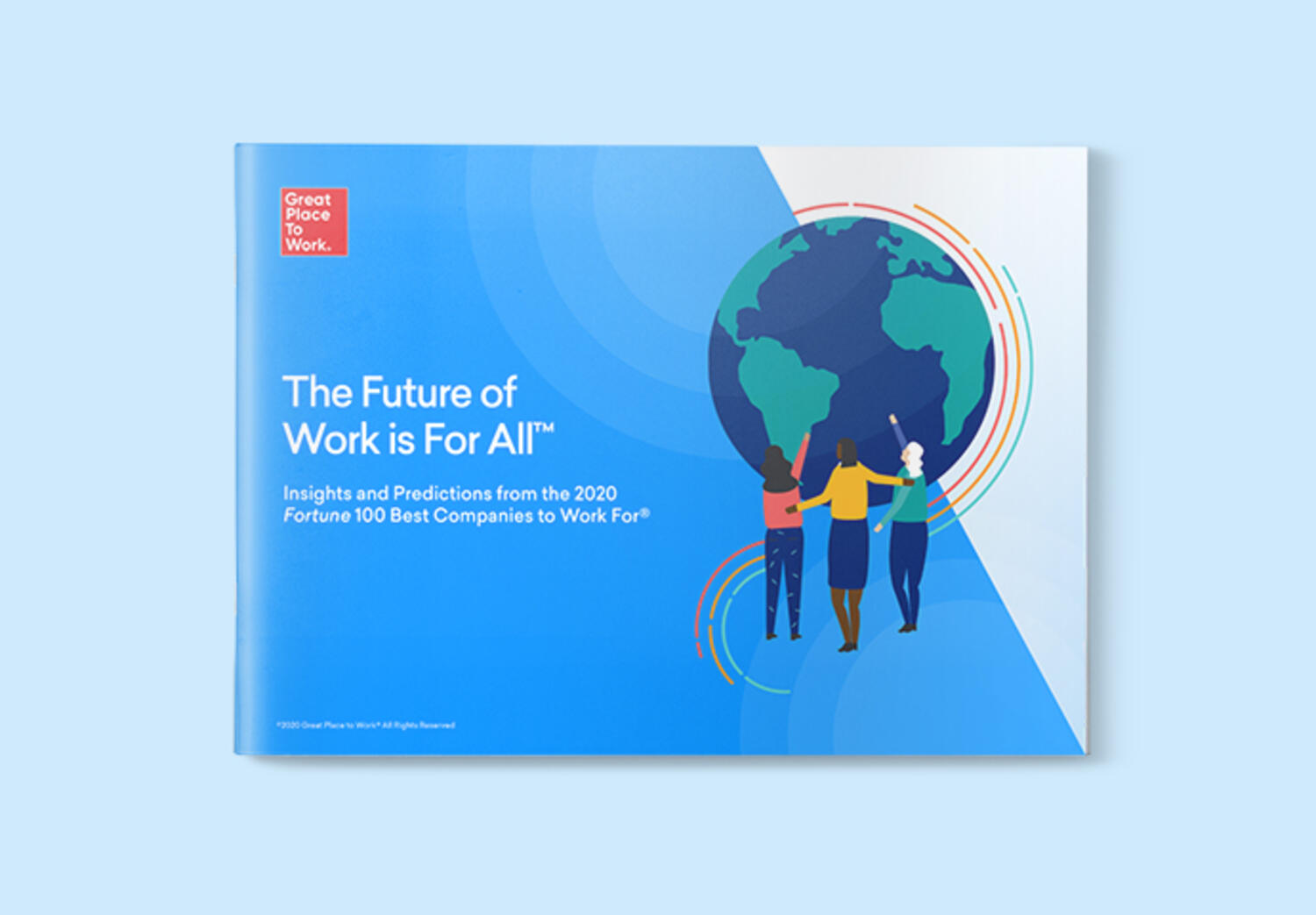Best Workplaces, Developing Leaders, Employee Surveys, High-trust leadership, Leadership & Management, Remote & Hybrid Culture
“Embracing change is not a nice to do, it's a must do from a growth perspective.”
Monique Herena, chief colleague experience officer at American Express, reminds us how and why change and discomfort can be so powerful in the workplace on this episode of Better.
You'll learn strategies that help leaders navigate change and inspire their teams. You'll also hear how American Express has navigated flexible work and why it's important for everyone, including individual contributors, to model values and leadership behaviors.
How do you encourage leaders to embrace change?
Every colleague at Amex — whether you're an individual contributor or leader of others — is rated from a performance perspective on not just what you do in terms of business goals, but how you do it.
Everything that we do from a leadership behavior perspective is about having an enterprise mindset, being collaborative, making courageous decisions, having an external perspective.
The way we instill that mindset is through a lot of support, a lot of training and tools, and an expectation that we need people to push against the status quo, push each other, have respectful debate, and ensure that we are really instilling a spirit of creative thinking, continuous learning, and bringing people along from a change perspective.
How can we do this better, more efficiently, competitively? How can we get better? How can we learn?
We would not be around for 170 years if we have not innovated time and time again.
How do you help identify leaders who are reluctant to change?
We spend an extraordinary amount of time on strategy and talent. We talk about it monthly, we're coaching people on the daily, and we set the tone around performance and leadership behaviors.
Are you demonstrating that change enterprise mindset? If not, how do you course correct? And if not, those people won't be here for the long term because you won't be able to perform at the level to sustain and grow at Amex.
It’s really important to set expectations and provide support, but also show what happens when you're not rowing in the same direction. Embracing change is not a nice to do, it's a must do from a growth perspective.
American Express has adopted a flexible work model, Amex Flex. How does that model work?
It is a flexible working model comprised of three work designations: fully onsite, fully virtual, and hybrid. The majority of our colleague base is hybrid.
I think we've done a really good job of listening and learning from our colleagues and not being afraid to evolve our thinking and pivot based on what we're hearing. This ensures that we craft the right solutions for our colleagues to meet their needs, but also that we meet the needs of our business and how we support our customers day in, day out.
We recently surveyed our colleagues, and 91% said they would recommend Amex as a great place to work, and that same percentage, 91%, feel supported by their leader in making decisions about their well-being.
American Express has been on the 100 Best list for 24 years, and is the No. 1 workplace in the financial industry. What is the secret to this consistency?
It’s a wonderful thing to be on lists where your colleagues are the ones putting you on those lists because it's really through their voices and experiences that give you those sort of rankings. We have a lot of pride in that.
We really believe that it's important to continue to have a consistent investment across the most important areas of your business. For us, our most important competitive advantage is our talent, and that's not sometimes. That's all the time.
If you could go back and give your younger self some advice, what would it be?
Today as an adult, I'm known as a change leader. I'm known as a courageous change leader. But I would go back and say, even though I took a lot of risks, upon reflection, I would take even more calculated risk. I would've pushed myself to do more of that because my career path was full of surprises. I pushed myself, and many times others pushed me way outside of my comfort zone. Looking back, those were the times that I grew exponentially and more so than I realized at the time.
From a research perspective, we learn upon reflection. Looking back at times when you had a little discomfort in the belly — not sure if you can land on your feet and deliver in the way you need to — those are the times where you're really learning and growing the most.
What book would you recommend to your peers?
I gave a copy of Adam Grant's most recent book, "Hidden Potential," to my team. I believe in the potential of everyone. I don't see our colleagues for where they are right now in this moment, but how we can invest in their growth and development over the long term.
There is a way to look at the world as a lifelong learner where no one really ever arrives. No one ever needs to be labeled as one thing or the other. We can all grow and change.
One of the insights I loved about Adam's book is that it's discomfort and getting out of your comfort zone that unlocks hidden potential, and there's no sort of person who has a unique ability to learn in a better, more efficient, more sophisticated way than another person.
Get more insights
Get more strategies from our workplace culture experts at our For All™ Summit, April 8-10, 2025 in Las Vegas, NV.
Subscribe to Better wherever podcasts are available so you don't miss an episode.
Welcome to Better By Great Place To Work, the Global Authority on workplace culture. I'm your host, Roula Amire, content director at Great Place To Work. Monique Herena, Chief Colleague Experience Officer at American Express joins me today and the theme that ran through our discussion was change, how necessary it is in the workplace, but how hard it can be. She talked about how the company helps leaders embrace change and what to do with leaders who aren't on board. You'll also hear how they've navigated flexible work and why it's important for everyone, including individual contributors, to model values and leadership behaviors. My conversation was a good reminder of why we all need to get comfortable with being uncomfortable if we want to learn and grow. Of course, that extends beyond work and we get into that as well. I'd love to hear from you on a time when you stepped outside your comfort zone at work and what happened. Enjoy the episode.
Well, Monique, welcome to the podcast. I'm excited to have you on. I'd love to start with your title. You are the Chief Colleague Experience Officer. I've read that described as a blend between CHRO, which is a chief HR officer, and a culture officer. Can you explain, is that correct and what that means?
Monique Herena:
Really it sounds very interesting and it sounds like it would have a much more interesting story than the reality. The truth is our chairman and CEO, when he became chairman and CEO in 2018, he set out a new vision for the company. It was really important for him as he was starting out to send a really strong signal that all employees at all levels in all areas of the company around the world were really important stakeholders and important to make the vision come to life, and so he started referring to our employees as colleagues when he rolled out that vision. That was about a year before I started, and the vision was to provide the world's best customer experience every day, and so employees became colleagues and it was a really important shift in mindset for people.
Basically this framework for winning is a one-page document. It rolled out refreshed blue box American Express values as we call them, the leadership behaviors we needed to achieve this vision. I started about a year later in 2019, and when I came, our work in HR I thought and he thought could be very closely linked to that vision and that strategy, and when we created the new HR strategy, we wanted to make sure that we really helped him operationalize that vision and one of the things that became apparent was calling our employees employees or HR seemed sort of out of sync with what he was trying to do.
So what we did was make sure our HR strategy was very closely tied to the business strategy. I've always been very commercial in the way I think about HR and we just called ourself the colleague experience group to make sure that we were focused not just on all colleagues, but also if we were going to make sure that our customers were getting the best experience every day than our colleagues just like we do for our consumers and our customers should also not just be having a good experience every day, but a great experience, because what we always say is the best way to have our customers' back is to have our colleagues' back, so they're really focused on the time that they're spending with our customers. So really that's how the title changed and all of our title changes happened in HR was to really sync up with the company strategy in a much tighter way and that's really where the title stems from.
Roula Amire:
That sounds like a significant change, a positive one, a good one, so let's stay on the topic of change. I know you've talked about the importance of embracing change, being agile, pivoting when necessary. Our research at Great Place To Work certainly tells us that agile workplaces produce higher rates of innovation. Employees are twice as likely to experience innovation opportunities when they say their workplace quickly adapts to change. Those are all wonderful upsides of agility, but change is hard. It's easy just to do the same old thing, especially when the same old thing has worked just fine. That's why people don't change. But we know change is necessary today, especially among leaders and all the challenges they have to face and will continue to face going forward. American Express is a 173-year-old company. How do you encourage leaders to embrace change? Are there new mindsets, new behaviors?
Monique Herena:
Part of our vision for the company, the framework for winning that I mentioned, actually lays out leadership behaviors. And every colleague at Amex, whether you're an individual contributor or you're a leader of others, is rated from a performance perspective, not just on what you do from a business goals perspective, but how you do it from a leadership perspective. From a very early stage, you are evaluated and therefore your pay is tied to it on not just what you do but how you do it. Do you bring others along or do you not in that case from a leadership perspective, and so really everything that we do from a leadership behavior perspective is about having an enterprise mindset, about being collaborative, about making courageous decisions, about having an external perspective. To your point around the company's history, we would not be around for 170 years if we have not innovated time and time again.
The way we instill that mindset is through a lot of support, a lot of training and tools and an expectation setting we have in the vision for the company, that we need people to really sort of push against the status quo, push each other, have respectful debate, and really ensure that we are really instilling in people this sort of spirit of creative thinking, continuous learning, and bringing people along from a change perspective. To your point, it's human nature to want to stay the same, but what we really try to encourage is a mindset of continuous improvement, continuous learning. How can we do this better, more efficiently, competitively, where are we really sitting relative to whatever we're working on? How can we get better? How can we learn? We do a lot to support the development of our colleagues around those leadership behaviors. We don't just take it for granted that they know how to seek development in those areas where they need support.
We also have something we call the American Express Career Growth Model, the Amex career growth model, and the biggest part of that model, the biggest component is around delivering results. Because that's really what gets us in the game and keeps us in the game, and the keeping you in the game is the innovation part because no company can keep performing and growing in the way that we've been growing without really being open to change and doing things differently and finding what works and sustaining that as well. The model provides a really consistent and simple language for our colleagues at all levels to talk about growth and we curate resources so they can go together as teams or individually to sort of gain additional support in terms of learning to just sort of bolster their experience as they're leading their teams in whatever change efforts they may have in sort of pushing themselves and continuing to do so.
Roula Amire:
How do you help identify leaders who are reluctant to change, because that is the real world, and how do you support them along to change?
Monique Herena:
We have a really robust performance and talent management process and systems. We spend an extraordinary amount of time even at the executive committee, which is the chairman and CEO that I report to in all of my peers, so the senior body of the company, really on strategy for the company and on talent. We talk about it monthly, we're coaching people on the daily, and we really set the tone around performance and the tone around the leadership behaviors. So not just the business goals and the technical things we all need to be focused on, but how are we working together? Are you demonstrating that change in enterprise mindset? If not, how do you course correct? And if not, those people won't be here for the long term because you won't be able to perform at the level to sustain and grow at Amex.
I think it's really important to set those expectations clearly, provide support along the way, but also show what happens when you're not rowing in the same direction. I think embracing change is not a nice to do, it's a must do from a growth perspective. Any of us, even in our personal life, when you think about the discomfort of that, the way you really grow, the way you really learn, and it's very research driven and basis, it's when you're most uncomfortable. I'm not saying that it's easy, but I think leadership support, like your direct leader day in-day out, when you think about it, the whole company top down really sort of providing an environment where that is the expectation. There's a lot of examples and models to look from and support that's being provided.
Given all of that, if you're still not embracing change, then there might be somewhere else where you can be more successful. But certainly here we need people who are embracing change and understand that mindset in terms of helping us achieve our growth ambitions over the long term.
Roula Amire:
I love that you made that point. I mean, our CEO, he's often said leaders want their people to change, but employees change when their leaders change. That's another way of saying it starts at the top, but it has to start there and, as you've said, be reinforced because if employees say, "Well, this leader doesn't hold those values, but they're here", that sends a message that the values don't really matter.
Monique Herena:
Absolutely. Absolutely. I think modeling the company's values, modeling the company's leadership behaviors is really important and that's why all of our learning programs really touch everyone. It's every single colleague, all people leaders as we call them, but also individual contributors because influencing across your peers, working on teams, that starts at a very early career stage. And it's really important to grow those muscles along the way because people are looking for models of great change leadership, great openness to continuous development, openness to change at all stages of their career and in all directions. So you've got to set the tone as a leader, but also I think people are looking to their peers, looking in all directions for the right values, the right leadership behaviors to be reinforced because change is really hard as you mentioned.
Roula Amire:
There's been no greater change in the workplace than where and how we work. American Express has adopted a flexible work model, Amex Flex, where I believe employees or their departments can choose where they work. Is that correct? Is it up to departments and employees or how does that model actually work?
Monique Herena:
It is a flexible working model. It's comprised of three work designations. One is fully onsite, one is fully virtual and one is hybrid. The majority of our colleague base is hybrid in terms of their work designation, which combines working in the office and then working virtually. I think we've done a really good job of listening and learning from our colleagues and not being afraid to evolve our thinking and pivot based on what we're hearing, to really ensure that we craft the right solutions for our colleagues to meet their needs, but also ensure that we meet the needs of our business and how we support our customers day in, day out.
We recently surveyed our colleagues and in fact, 91% of our colleague base would recommend Amex as a great place to work, and that same percentage, 91%, feel supported by their leader in making decisions about their wellbeing. We hear a lot broadly outside of the company around sort of the tension sometimes even with hybrid or virtual work and we really feel like we've done a great job listening in terms of enhancing our technology, providing support for leaders and their teams about how to optimize. We all know some days are more challenging than others, but I think we've done a really great job of tapping into the benefits of the best of both worlds, of having some time working virtually, but also being together, which we think is incredibly important.
Roula Amire:
Speaking of your culture, you've been on the 100 best list for 24 years, you're the number one place to work in the financial industry. If you had to summarize the secret to this consistency, what would you say?
Monique Herena:
First of all, it is a wonderful thing to be on lists where your colleagues are the ones putting you on those lists because it's really through their voices, through their experiences that are giving you those sort of rankings. We have a lot of pride on that and pride in that. I would tell you that we do really believe that it's important to continue to have a consistent investment across the most important areas of your business. For us, our most important competitive advantage is our talent, and that's not sometimes. That's all the time.
Roula Amire:
Hey, Better listeners, want to put your headphones down and meet culture leaders in person? Network and learn from the most innovative companies across every industry? Hear from best bestselling authors like Angela Duckworth and the Emmy nominated actress Mindy Kaling? Then mark your calendars May 7th through ninth and join us in New Orleans at the Great Place To Work For All summit, the can't-miss company culture and leadership event of the year. Use the code Better2024 to save $200 off, registration before April 7th. Find the code and link in our episode bio. See you there.
If you could go back and give your younger self some advice, what would it be?
Monique Herena:
What would I say? If I would give my younger self some advice, I would probably tell myself four things. I get asked this question from time to time, so I've thought about it a lot and I happen to have three kids, so I think about it probably even more so because of that. First I would tell myself today as an adult, I'm known as a change leader, I'm known as the courageous change leader. But I would go back and say, even though I took a lot of risks, upon reflection, I would say take even more calculated risk. The reason I say that is I would've pushed myself to do more of that because my career path was really full of surprises and I really pushed myself and many times others pushed me way outside of my comfort zone. Looking back, those were the times that I really grew exponentially and more so than I realized at the time.
I'm sure you know from a research perspective, we really do learn upon reflection, and looking back those times where you've got a little discomfort in the belly where you're really not sure if you can land on your feet and deliver in the way you need to, those are the times where you're really learning and growing the most. So I would take more chances and I would push myself even further. That would be one. I think the second one is the importance of really leading with empathy and purpose. I think empathy is really the key to the universe and a lot of the solution to things that are going on in the world and I think that's the most important part of leadership.
I think throughout my career what I have found that yes, the business goals and the vision and bringing others along with you are really important, and having them see that with you and want to follow you towards achieving that, but really understanding who people are, what motivates them, helping them understand who you are and being open to that and building trust in that way and really understanding how that shared purpose and vision you're trying to achieve connects to them as people, connects to you as a person, those authentic leadership sort of connections with your team just make it so much more fulfilling for you and for everyone on the team and how they connect and work with each other.
I just think that it's really important. We all spend a ton of time at work. This is our life. We got one shot at it and I just think that type of empathy and environment just makes it so much more fulfilling. That would be the second one. I think the third thing I would say is that I don't think that you can balance your work and personal stuff, I have learned, but I think you can integrate it fully some days better than others and I would tell my younger self to give myself some grace and not apologize for being one person with one calendar. I have gotten really, really good at that over time, and I've helped a lot of other people and encouraged them to do the same.
I've got a really strong and supportive home team and community, and I think that's crucial for long-term success as a leader, and I think you've got to make decisions and whatever your home team sort of look like as a team. Because they continue to inspire and influence me. I don't have any guilt about the job I love and I don't have any guilt about the home team that I love. I really try to integrate it the best I can. I don't associate any negativity with us. All of us are human. We're going to miss some things. We're going to be in some places when we wish we were in other places, but if you're lucky enough to have a passion for what you do and love what you do, I think it's all positive and just kind of trying to find ways to manage your energy to integrate it the best you can, but know that it's never going to be perfect and no one person has it figured out. So I would give myself a lot more grace as my younger self.
Lastly, I would just say seek out really different experiences early, really diverse experiences early and really embrace growth opportunities. All of the times that I was young and dreaming of traveling around the world, I didn't have a lot of role models that did that, but that's for some reason what I wanted to do, and I ended up doing it. I moved a couple of times around the world as an expat. I was managing people and working with people from a lot of different cultures. I think the more you expose yourself to different thinking, different culture, different ways of doing things, the faster you grow as a leader and as a person, and I do think that seeking that out is really important. We talked about pushing yourself outside of your comfort zone. I think that's one important way to do it.
Roula Amire:
Where else have you lived?
Monique Herena:
I've lived in Dubai with my family for almost four years. I lived in the Caribbean for about a year, and then we've moved across the US many times. We're pretty good at moving.
Roula Amire:
You're agile, right? You can pivot, you can pick pp and go.
Monique Herena:
Agile, for sure. Yes.
Roula Amire:
Yes. Just want to follow up on one of your points. You mentioned empathy and needing that as a leader, and that's something Kelly Jones mentioned when I interviewed her at Cisco. She was talking about these soft skills like that and how they become hard skills as leaders. I think in our younger selves, if those skills are taught as hard skills, those softer skills, that we'd all be more empathetic and kinder to ourselves and then therefore in our work. So hopefully that's a shift people are making.
Monique Herena:
I even think the terms hard and soft skills are ... we just need to drop that. I think there's a lot of terms that start out for good, reason sometimes based on research, sometimes based on just an easier way to get people to understand a concept, but they don't always do us a great service because all of those skills are critical. They're all business skills, they're all life skills, and you give this unnecessary sort of hierarchy or importance to the hard skills, but in fact, they're equally important. They're equally impactful to being successful.
Roula Amire:
Is there anything you're reading or listening to that you'd recommend to your peers?
Monique Herena:
Yeah. In fact, I just gave a copy of Adam Grant's most recent book to my team. I was lucky enough to host a conversation with Adam that we broadcast live to all of our colleagues recently on coaching and direct feedback with Adam and got to chat with him a little bit, so that was great. I read his most recent book, which is called Hidden Potential, and I'll talk about why I love the book and why I gave it to my team, but I would tell you that it's one of the reasons I love what I do day in day out. It's because that I say we can all be better in the next moment. It's why I love the name of your podcast too, by the way, than we are right now. I really believe in the potential of everyone. I don't see our colleagues for where they are right now in this moment, but how we can invest in their growth and development over the long term.
I think it's really important to have that mindset. I think there is a way to look at the world as a lifelong learner that no one really ever arrives. No one ever needs to be labeled as one thing or the other. We can all grow and change. That's what's amazing about learning. In fact, I was in my 40s when I got my second master's at Columbia in change leadership in organization psychology. I was already a sitting chief human resources officer and somehow, don't ask me how now in retrospect, I had the time to go do that and I tried to really model being a lifelong learner. It doesn't matter what job you have at what level, that we can all be better and learn in the next moment. One of the insights I loved about Adam's book and that really resonated with me is that it's discomfort and really getting out of your comfort zone.
That's what unlocks hidden potential, and that there's no sort of person that has some unique ability to learn in a better, more efficient, more sophisticated way than another person. That it's really a muscle and a skill and learning really is a skill, and it's how much you put into it, how many times you're willing to fail, how much you're willing to be humble and learn from failures because we don't learn the most from success, we learn the most from sort of screwing up and then applying those learnings and our willingness to sort of set that example that it's about being uncomfortable, it's about sort of that ultimate trying over and over and being willing to fail and showing people that that's where we learn the most and how are we going to get better at this? How are we going to learn not to do that again and take another path?
I think that that kind of growth acceleration that happens, and we've seen it in ourselves and so many others, is really important to teach, I think, at every stage of development, including in schools, and that's what I really loved about his book.
Roula Amire:
That's a great recommendation and very timely. We should add to your list Amy Edmondson's new book, we just had her on, it's called The Right Kind of Wrong, Why Learning to Fail Can Teach Us to Thrive. It sounds right up your alley.
Monique Herena:
Yes. Sounds great.
Roula Amire:
How do you create a sense of wellbeing for yourself?
Monique Herena:
Great question. I have a lot of responsibility. I feel the weight of it. I take it seriously. What I mean by that is I need to show up at my best for our 70,000 plus colleagues around the world. I have an outstanding team whose job it is to really make sure our colleagues have a great experience every day. And that means I need to have great energy, focus, stamina along with them and I feel like I have to role model that. That's both having great energy, but also showing humility on the days where maybe you're not feeling so great. I've written blogs on mental health and opened up myself just to really demystify and really remove the stigma around that as we talk about holistic wellbeing at Amex. But I would say that I'm incredibly disciplined about my routine and my schedule, and that's what works for me.
I do think that as individuals, we have to kind of through trial and error learn about ourselves and see what works for us and it's changed for me over different seasons of my life as I've gone through different stages of life. But what really works for me is meditation. I practice mindful meditation. Each morning, it's a time where no one's looking for me, it's quiet. I do basically mindful meditations like using a mantra. It really sets my intention for the day of how I want to show up for myself and others, and it's just a really quiet, beautiful time where I feel like I can kind of have my most creative thoughts and sort of get ready for the day. I like to move, so movement's very important to me in terms of managing my energy and wellbeing. For me, it's SoulCycle, which is spinning and lifting weights, so throughout the week I spend time doing that, and then really nutrition. So fueling my day with food and beverages that really give me energy versus take energy away from my day.
I have long days. Sometimes I have evening events, many times I have evening events. I think really fueling yourself in a way that helps you manage your energy through movement, in my case, through meditation, through my nutrition, is important. Then one of the ways that I take care of myself is yes, I work very hard and have a lot of responsibility, but I also spend a lot of time with my family. I have an amazing husband. I have three kids, two in college, and one's still at home. I have a great dog. We live in New York City. Central Park is close to where we live, so it's like the best backyard in the universe. I spend time with my family, which really helps me recharge as well.
Roula Amire:
Well, Monique, thank you for joining. Thanks for sharing all your insights and tips. I really enjoyed the conversation.
Monique Herena:
Yes, thank you, Roula. I really appreciate you guys having me. It's been great. I really appreciate it.
Roula Amire:
Thanks for listening. If you enjoyed today's podcast, please leave a five star rating, write a review, and subscribe so you don't miss an episode. You can stream this and previous episodes wherever podcasts are available.


